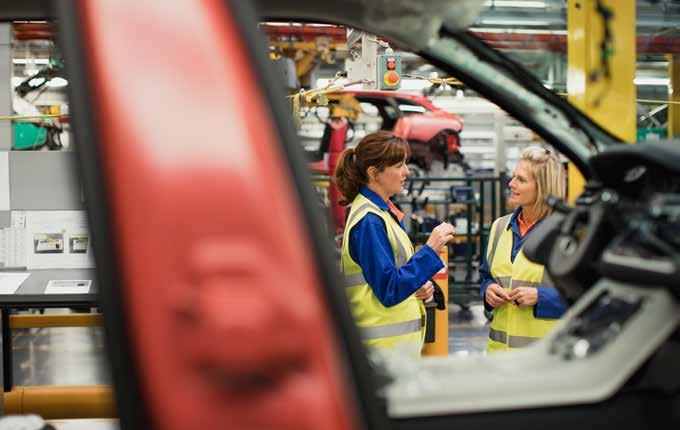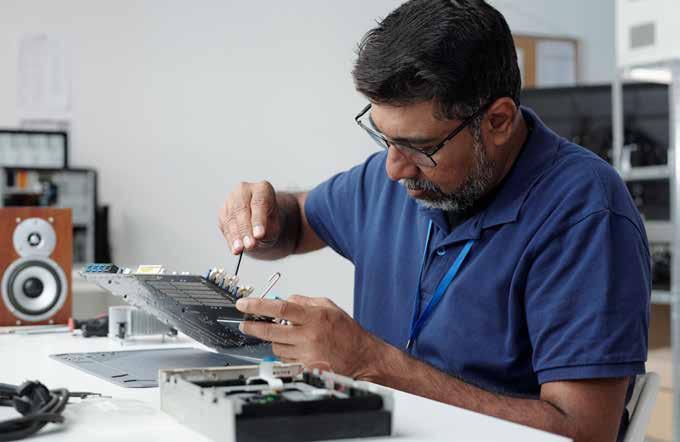
A better life The green route to growth and security


A better life The green route to growth and security
“Improving living standards and nurturing thriving communities across the UK must be prioritised in the transition to a green economy.”
The government faces a multitude of intersecting threats: rising poverty, restricted growth and an unstable geopolitical landscape, marked by war in mainland Europe, a changing global trading environment and the growing impacts of the climate crisis. Meanwhile, the leading cause of climate change, the use of fossil fuels, is also driving the rising cost of living, stalling economic growth and increasing deprivation across the UK.
Some are trying to pit these threats against each other, overlooking how deeply connected they are. What’s needed instead is a focus on opportunity.
Opportunity is found in policies prioritising a green economy which can improve living standards, safeguard national security and protect the natural world on which our wellbeing depends.
Green businesses are growing three times faster than the rest of the UK economy and voters of all backgrounds think we should act to reverse environmental breakdown.
To protect the UK effectively and achieve a positive vision for people and our economy, the government must recognise the benefits of maintaining environmental spending.
Improving living standards and nurturing thriving communities across the UK must be priorities in the transition to a green economy. This is the foundation on which we have built our recommendations in two key areas of opportunity, growth and security. People are at the heart of both:
UK-wide growth, centred on green investment across all regions: creating high quality jobs and supporting businesses and industries to grow and compete internationally, while cutting emissions.
Resource and energy security: ensuring the UK has a stable and sustainable supply of energy, food and materials by investing in domestic renewables, nature restoration and the circular economy.
We outline policy measures that will unlock these opportunities. They won’t fix the crises alone, but their intersecting benefits will enable the government to lay the groundwork for a better future for the UK.
“
Only through investing now can we keep bills down in future.”

Climate change, intense competition for resources and volatile geopolitics mean it has never been more important to invest in domestic clean power.
The cost of living crisis has shown the damage that depending on a fossil fuel regime can do. The spike in gas and oil prices caused by gas supply shortages and Russia’s weaponisation of energy supplies were the primary reason for record levels of inflation. This has driven up prices and made life more expensive for UK households since 2022.
Around 80 per cent of the April 2025 energy price cap rise is due to the increased wholesale price of gas. Only through investing now can this level of exposure and risk be prevented, and bills be kept down in future.
What needs to change?
Sever the link between gas prices and electricity costs to bring energy bills down. As the UK’s power system becomes dominated by renewable power like wind and solar, the government should accelerate efforts to severe the link between gas prices and electricity costs for homes and businesses. Wholesale electricity prices are mostly determined by the cost of gas-fired power, even when cheaper renewable sources of electricity generation are available. Breaking this link would reduce the impact of volatile
“
Nature restoration creates jobs at all skill levels, and more in areas facing the greatest labour challenges.”
international fossil fuel markets on the cost of living in the UK and allow electricity prices to be set by homegrown renewables with low operating costs.
Uphold Labour’s manifesto commitment of £13.2 billion for warmer homes funding. Accelerating the uptake of heat pumps, which are three to five times more efficient than gas boilers, and expanding home insulation are necessary steps to reduce energy demand and cut household bills. National Energy Action estimates there are currently 6.1 million households in fuel poverty. If inefficient homes had been upgraded to EPC band C in 2022 it would have saved consumers £24 billion on their energy bills by 2030.
Reduce funding costs for renewables. The Bank of England should introduce a Term Funding Scheme for renewable energy developments. This would enable low cost loans for a fixed term period. Renewables are vital to the Bank’s price stability objective. By providing a stable energy price, the Bank can protect the UK from future gas price shocks and spiralling inflation.
Reform contracts for difference (CfDs). Consumers need to see the benefits from lower cost renewables. CfDs offer a guaranteed price for electricity generators to encourage investment and lower costs for consumers. Contracts should be extended from 15 to 25 years to create longer term price stability.

As the environment changes due to climate change and nature decline, food supplies face greater volatility. Climate change has already added an estimated £361 annually to the average UK household food bill.
Climate change and biodiversity loss are consistently found to be the greatest threats to domestic food security. Between October 2022 and March 2024, the UK experienced the wettest 18 months since records began, projected to reduce food self-sufficiency by a tenth. Wet weather, extreme heatwaves and increased pests and diseases have all contributed to shortages on supermarket shelves in recent years.
“ Reducing food waste could save an average UK household £600 per year.”
The least productive ten per cent of farmland provides just one per cent of calorie production in England. This land could instead be more productive for the economy and communities if its use was focused on environmental delivery. In doing so, it would contribute to the ecosystem health needed to support wider food production, including by mitigating climate change and flooding. Nature restoration creates jobs at all skill levels, and more in areas facing the greatest labour challenges. Doing more to expand and maintain woodland, peatland and parks could create 16,050 jobs in areas with employment challenges.
With more directed investment and careful land management, the UK would increase its food resilience and ensure farmers earn a decent living. The route to doing this is by improving the health of the ecosystems on which food production relies.
What needs to change?
Invest £3.1 billion to restore nature and deliver other public goods through England’s Environmental Land Management scheme. Through the farming budget, the government supports farmers to use their land in a way that benefits society, including reducing flood risk, creating more carbon-storing habitats and mitigating climate change.
Reopen farm funding schemes to support farmers to improve environmental outcomes. The government should urgently reopen the Higher Tier Countryside Stewardship and Landscape Recovery schemes, as these support ambitious action, boost incomes for the lowest paid farmers and use taxpayer money most efficiently.
Introduce mandatory food waste reporting for producers. WRAP estimates the UK wastes 10.7 million tonnes of food, each year, while reducing food waste could save an average UK household £600 per year.
Ensure resource security with a circular economy

The UK imports around 80 per cent the materials it uses. Of particular importance are those deemed ‘critical’ for applications like energy technology. As global markets become increasingly volatile, securing these supply chains is more important than
“Public procurement should require the use of reused or recycled content in products.”
ever. But we have a growing reserve of these materials accumulating in existing products and infrastructure and, unlike fossil fuels, most of these materials can be reused time and again.
Reusing and recycling existing products can fulfil an increasing proportion of the UK’s demand for critical raw materials as more and more technologies, like batteries and wind turbines, reach the end of life. Expanding remanufacturing businesses for just ten wind turbine components with well established supply chains over the next ten years could create 20,000 jobs and a UK market worth £9.6 billion.
What needs to change?
Improve data on material flows. Tracking materials through the economy, starting with critical raw materials, enables better use and retention and reduces UK reliance on imports.
Ensure public procurement boosts circular business. Innovative companies in sectors like construction can struggle to get off the ground, but the power of public funding to drive the market for lower environmental impact technologies would enable solutions like modern methods of construction which would enable quicker, more efficient housebuilding to expand. Public procurement should require the use of reused or recycled content in products.
Set design targets, including recycled content and recyclability requirements, for products like batteries. The EU has already done this. It will avoid the UK missing out on the chance to develop its domestic circular industries, as well as providing a secure domestic supply of materials.
Make secure access to critical minerals a key part of international diplomacy. The UK should champion circularity and material reduction to ensure all countries have the critical raw materials they need for a low carbon economy, through the UK-led Global Clean Power Alliance. Ensuring all countries can access these resources, and that those that were disadvantaged by previous energy revolutions are not also disadvantaged by this one, will increase global stability.
The green economy grew by ten per cent in 2024.”
The UK’s green economy grew by ten per cent in 2024, three times faster than the wider economy. It provides inputs, and acts as an enabler and productivity multiplier, contributing to the success of other sectors.
It has the potential to positively shape UK services, homes and communities for years to come. As the world evolves, there is a once in a generation chance for the UK to lead globally in these new economic opportunities and create the next wave of highly skilled, well paid jobs. UK firms could have access to a global market for net zero goods and services worth £1 trillion by 2030, but this advantage will be quickly lost by failing to invest now.
Support heavy industry and manufacturing

Heavy industry and manufacturing are vital to economic resilience and integral to the UK’s cultural heritage and thriving communities. They underpin critical sectors, such as energy generation, transport and defence, while providing well paid, highly skilled work outside London and the South East.
But industrial communities across the country are up against significant challenges. Once strong sectors like steel and automotive manufacturing have suffered from long term underinvestment and now struggle to compete with their lower cost international competitors. The UK’s ageing infrastructure also requires urgent modernisation to enable businesses to remain competitive.
“ Governments and companies are increasingly demanding low carbon materials.”
Despite these challenges, there is still significant potential. The UK’s automotive sector could be worth £106 billion by 2030 if an electric vehicle manufacturing base can be established. With 780,000 people currently employed in the sector and 3,480 businesses directly involved in vehicle and parts manufacturing, securing a sustainable future by making this transition is critical to avoid a looming jobs crisis.
Governments and companies are increasingly demanding low carbon materials. From 2026, the EU will impose tariffs on high carbon imports of materials like cement and steel. As industrial plants operate for decades, investing now in low carbon production is the best way to secure the future of these heavy industries in Britain.
Using the country’s established position at the forefront of renewables and clean technologies to lead on clean manufacturing, there is a unique opportunity to sell UK expertise to a rapidly expanding global market. With the right investment and strategic vision, domestic supply chains can be strengthened to reduce reliance on imports and position the UK in the world as a leading exporter of sustainable materials, new clean technologies and industrial expertise.
What needs to change?
Protect National Wealth Fund and Industrial Energy Transformation Fund investment. The expansion of the National Wealth fund’s remit and wider financial pressures must not reduce the £5.8 billion allocation to fund green industries or its climate remit and investment in nature-based solutions. Instead, areas of mutual benefit should be sought between the defence and net zero sectors, in UK supply chains and industrial capacity, to maximise these investments for national and economic security. The National Wealth Fund should also take account of wider socioeconomic benefits when making its investments and not just financial returns.
Effective implementation of UK Carbon Border Adjustment Mechanism (CBAM) by 2027. The CBAM is a tax on high carbon imports (like steel and cement) to protect UK businesses from unfair competition. It will ensure that all businesses pay the same carbon costs, and encourage cleaner production globally. The new UK CBAM should have built-in flexibility to account for unexpected impacts, followed by rapid consideration of the other sectors it could cover, including chemicals and downstream processes for sectors like steel.
Involve workers and communities in the industrial change affecting them. This is needed to protect jobs wherever possible and ensure investment delivers benefit for local people. It could be done, for instance, by making funding for industrial transformation conditional on a just transition plan involving workers. Devolving strategic planning and spending to local authorities when possible will allow those with local expertise to shape the conditions for change, and direct public investment to where it will have the most local impact.
“
Growing the circular economy could create over 450,000 jobs by 2035.”

Expanding reuse and repair services could provide new employment in all areas of the UK, while contributing to environmental protection and resource security.
Growing the circular economy could create over 450,000 jobs by 2035. Specifically, over 300,000 positions could emerge in remanufacturing, with an additional 30,000 possible in repair businesses. A third of these would benefit lower skilled workers, addressing unemployment in underserved regions like the North East and the West Midlands.
What needs to change?
Zero rate VAT on repair and refurbishment. This will provide a major incentive to increase reuse and repair services and cut costs for consumers.
Speed up the route to market for new products and services. The UK has strong research and development capability, including in recycling technologies, but has been slow to capture the subsequent economic benefits. Support should be targeted at innovations in recycling critical raw materials as a strategic priority.
“Better rail services could transform regional growth and connect more communities.”

Better rail services could boost regional growth and connect more communities. It also creates new economic and leisure opportunities, and significantly cuts carbon emissions by avoiding car journeys.
What needs to change?
Approve the Northern Arc. Transport for the North estimates that better connecting northern urban centres with one another could help to bring £118 billion in economic growth and 850,000 new jobs to the North by 2050.
Invest in regional rail infrastructure. Specifically, this is needed in areas where connectivity and reliability is poor. Rail improvements beyond the South East could tackle a range of economic challenges, increasing productivity and attracting more business and investment
Invest in active travel to cut air pollution, improve public health and boost local economies. Congested roads and ill health from air pollution creates significant costs for businesses and communities. The UK has some of the lowest rates of active travel (ie walking, wheeling and cycling) in Europe. Every £1 spent on active travel infrastructure yields an average return of £5.62, whereas road building, by contrast, averages a return of just £2.50 per £1 spent.
Ensure every community has a minimum bus service guarantee. This should be enshrined in law. It has been calculated that every £1 spent on bus services delivers a return on investment of up to £3.80 in economic, social and environmental benefits.
Green Alliance
18th Floor
Millbank Tower
21-24 Millbank
London SW1P 4QP
020 7233 7433
ga@green-alliance.org.uk
www.green-alliance.org.uk
@GreenAllianceUK
blog: www.greenallianceblog.org.uk
Lead author
Cath Smith, head of social impact
Other Green Alliance staff who contributed to drafting this publication: Libby Peake, Lydia Collas, Nick Davies, Matilda Dunn, Faustine Wheeler, Lucy Pegg, Stuart Dossett, Steve Coulter, Blanche Shackleton, Chris Venables, Roz Bulleid, Johann Beckford, Rosie Allen and Sarah Williams.
Green Alliance
Green Alliance is an independent think tank and charity focused on ambitious leadership for the environment. Since 1979, we have been working with the most influential leaders in business, NGOs and politics to accelerate political action and create transformative policy for a green and prosperous UK.
The Green Alliance Trust Registered charity no 1045395 Company limited by guarantee (England and Wales) no. 3037633
Published by Green Alliance April 2025
ISBN 978-1-915754-59-2
Designed by Howdy
© Green Alliance, April 2025
The text and original graphics in this work are licensed under the Creative Commons AttributionNonCommercial-NoDerivatives 4.0 International licence. To view a copy, visit http://creativecommons.org/ licenses/by-nc-nd/4.0/. Any use of this content should credit Green Alliance as the original author and source. Photographic images are subject to separate copyright and are not covered by this licence.

